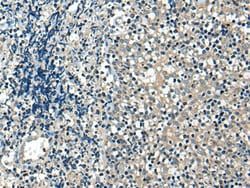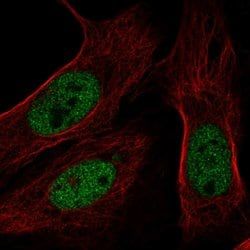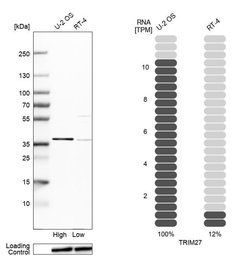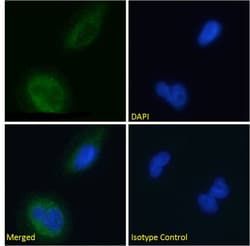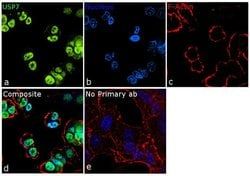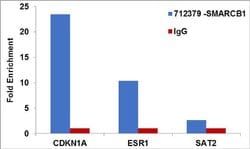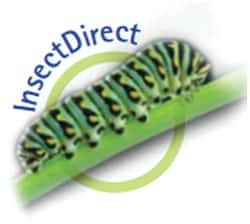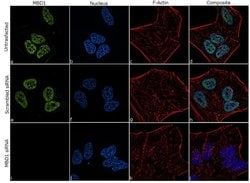USP7 Recombinant Polyclonal Antibody (8HCLC), Invitrogen™
Manufacturer: Invitrogen
Select a Size
| Pack Size | SKU | Availability | Price |
|---|---|---|---|
| Each of 1 | 71-237-4-Each-of-1 | In Stock | ₹ 42,720.00 |
71-237-4 - Each of 1
In Stock
Quantity
1
Base Price: ₹ 42,720.00
GST (18%): ₹ 7,689.60
Total Price: ₹ 50,409.60
Antigen
USP7
Classification
Recombinant Polyclonal
Concentration
0.5 mg/mL
Formulation
PBS with 0.09% sodium azide; pH 7.4
Gene Accession No.
Q93009
Gene Symbols
USP7
Immunogen
Protein corresponding to human USP7 [aa537-aa664]
Quantity
100 μg
Primary or Secondary
Primary
Target Species
Human
Product Type
Antibody
Isotype
IgG
Applications
Immunocytochemistry
Clone
8HCLC
Conjugate
Unconjugated
Gene
USP7
Gene Alias
2210010O09Rik; AA409944; AA617399; AU019296; AW548146; C80752; deubiquitinating enzyme 7; Hausp; Herpes virus-associated ubiquitin-specific protease; herpes-virus-associated ubiquitin-specific protease; herpesvirus-associated ubiquitin-specific protease; mHAUSP; protease; rHAUSP; TEF1; Ubiquitin carboxyl-terminal hydrolase 7; ubiquitin specific peptidase 7; ubiquitin specific peptidase 7 (herpes virus-associated); ubiquitin specific protease 7; ubiquitin specific protease 7 (herpes virus-associated); ubiquitin thioesterase 7; ubiquitin thiolesterase 7; ubiquitin-specific-processing protease 7; UBP; USP7
Host Species
Rabbit
Purification Method
Protein A
Regulatory Status
RUO
Gene ID (Entrez)
7874
Content And Storage
Store at 4°C short term. For long term storage, store at -20°C, avoiding freeze/thaw cycles.
Form
Liquid
Description
- This antibody is predicted to react with Monkey, Pig, Mouse, Rat
- Recombinant rabbit polyclonal antibodies are unique offerings from Thermo Fisher Scientific
- They are comprised of a selection of multiple different recombinant monoclonal antibodies, providing the best of both worlds - the sensitivity of polyclonal antibodies with the specificity of monoclonal antibodies - all delivered with the consistency only found in a recombinant antibody
- While functionally the same as a polyclonal antibody - recognizing multiple epitope sites on the target and producing higher detection sensitivity for low abundance targets - a recombinant rabbit polyclonal antibody has a known mixture of light and heavy chains
- The exact population can be produced in every lot, circumventing the biological variability typically associated with polyclonal antibody production
- USP7 or HAUSP is a ubiquitin specific protease or a deubiquitylating enzyme that cleaves ubiquitin from its substrates
- Since ubiquitylation (polyubiquitination) is most commonly associated with the stability and degradation of cellular proteins, HAUSP activity generally stabilizes its substrate proteins
- HAUSP is most popularly known as a direct antagonist of Mdm2, the E3 ubiquitin ligase for the tumor suppressor protein, p53
- Normally, p53 levels are kept low in part due to Mdm2-mediated ubiquitylation and degradation of p53
- Interestingly, in response to oncogenic insults, HAUSP can deubiquitinate p53 and protect p53 from Mdm2-mediated degradation, indicating that it may possess a tumor suppressor function for the immediate stabilization of p53 in response to stress
- Another important role of HAUSP function involves the oncogenic stabilization of p53
- Oncogenes such as Myc and E1A are thought to activate p53 through a p19 alternative reading frame (p19ARF, also called ARF)-dependent pathway, although some evidence suggests ARF is not essential in this process
- An intriguing possibility is that HAUSP provides an alternative pathway for safeguarding the cell against oncogenic insults.
